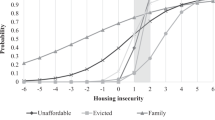Abstract
This mixed-method study used administrative data from 68 supportive housing programs and evaluative and qualitative site visit data from a subset of four forensic programs to (a) compare fidelity to the Housing First model and residential client outcomes between forensic and nonforensic programs and (b) investigate whether and how providers working in forensic programs can navigate competing Housing First principles and criminal justice mandates. Quantitative findings suggested that forensic programs were less likely to follow a harm reduction approach to substance use and clients in those programs were more likely to live in congregate settings. Qualitative findings suggested that an interplay of court involvement, limited resources, and risk environments influenced staff decisions regarding housing and treatment. Existing mental health and criminal justice collaborations necessitate adaptation to the Housing First model to accommodate client needs.
Similar content being viewed by others
References
Barrenger, S. L., & Draine, J. (2013). “You don’t get no help”: The role of community context in effectiveness of evidence-based treatments for people with mental illness leaving prison for high risk environments. American Journal of Psychiatric Rehabilitation, 16, 154–178. doi:10.1080/15487768.2013.789709.
Carpenter, J. (2002). Mental health recovery paradigm: Implications for social work. Health and Social Work, 27, 86–94. doi:10.1093/hsw/27.2.86.
Collins, S. E., Clifasefi, S. L., Dana, E. A., Andrasik, M. P., Stahl, N., Kirouac, M., et al. (2012). Where harm reduction meets Housing First: Exploring alcohol’s role in a project-based Housing First setting. International Journal of Drug Policy, 23, 111–119. doi:10.1016/j.drugpo.2011.07.010.
Crabtree, B. F., & Miller, W. L. (1999). Using codes and code manuals: A template organizing style of interpretation. In B. F. Crabtree & W. L. Miller (Eds.), Doing qualitative research (2nd ed., pp. 163–177). Thousand Oaks, CA: Sage.
Cresswell, J. W., & Plano Clark, V. L. (2011). Designing and conducting mixed methods research (2nd ed.). Thousand Oaks, CA: Sage.
Deegan, P. E., & Drake, R. E. (2006). Shared decision making and medication management in the recovery process. Psychiatric Services, 57, 1636–1639. doi:10.1176/appi.ps.57.11.1636.
Drake, R. E., Mercer-McFadden, C., Mueser, K. T., McHugo, G. J., & Bond, G. R. (1998). Review of integrated mental health and substance abuse treatment for patients with dual disorders. Schizophrenia Bulletin, 24, 589–608. doi:10.1093/oxfordjournals.schbul.a033351.
Gilmer, T. P., Katz, M. L., Stefancic, A., & Palinkas, L. A. (2013a). Variation in the implementation of California’s full service partnerships for persons with serious mental illness. Health Services Research, 48(6), 2245–2267.
Gilmer, T. P., Stefancic, A., Sklar, M., & Tsemberis, S. (2013b). Development and validation of a Housing First fidelity survey. Psychiatric Services, 64, 911–914. doi:10.1176/appi.ps.201200500.
Griffin, P. A., Steadman, H. J., & Petrila, J. (2002). The use of criminal charges and sanctions in mental health courts. Psychiatric Services, 53, 1285–1289. doi:10.1176/appi.ps.53.10.1285.
Lamb, H. R., Weinberger, L. E., & Gross, B. H. (1999). Community treatment of severely mentally ill offenders under the jurisdiction of the criminal justice system: A review. Psychiatric Services, 50, 907–913. doi:10.1176/ps.50.7.907.
Lamberti, J. S., Russ, A., Cerulli, C., Weisman, R. L., Jacobowitz, D., & Williams, G. C. (2014). Patient experiences of autonomy and coercion while receiving legal leverage in forensic assertive community treatment. Harvard Review of Psychiatry, 22, 222–230. doi:10.1097/01.HRP.0000450448.48563.c1.
Livingston, J. D., Nijdam-Jones, A., & Team, P. E. E. R. (2013). Perceptions of treatment planning in a forensic mental health hospital: A qualitative, participatory action research study. International Journal of Forensic Mental Health, 12, 42–52. doi:10.1080/14999013.2013.763390.
Padgett, D. (2008). Qualitative methods in social work research (2nd ed.). Thousand Oaks, CA: Sage.
Palinkas, L. A., Horwitz, S. M., Chamberlain, P., Hurlburt, M. S., & Landsverk, J. (2011). Mixed-methods designs in mental health services research: A review. Psychiatric Services, 62(3), 255–263.
Patton, M. (1990). Qualitative evaluation and research methods. Beverly Hills, CA: Sage.
Prochaska, J. O., DiClemente, C. C., & Norcross, J. C. (1992). In search of how people change: Applications to addictive behaviors. American Psychologist, 47, 1102–1114. doi:10.1037/0003-066X.47.9.1102.
Skeem, J. L., Manchak, S., & Peterson, J. K. (2011). Correctional policy for offenders with mental illness: Creating a new paradigm for recidivism reduction. Law and Human Behavior, 35, 110–126. doi:10.1007/s10979-010-9223-7.
Stefancic, A., Hul, L., Gillespie, C., Jost, J., Tsemberis, S., & Jones, H. (2012). Reconciling alternative to incarceration and treatment mandates with a consumer choice Housing First model: A qualitative study of individuals with psychiatric disabilities. Journal of Forensic Psychology Practice, 12, 382–408. doi:10.1080/15228932.2012.697424.
Strauss, A., & Corbin, J. (1994). Grounded theory methodology. In N. K. Denzin & Y. S. Lincoln (Eds.), Handbook of qualitative research (pp. 273–285). Thousand Oaks, CA: Sage.
Tiderington, E., Stanhope, V., & Henwood, B. F. (2013). A qualitative analysis of case managers’ use of harm reduction in practice. Journal of Substance Abuse Treatment, 44, 71–77. doi:10.1016/j.jsat.2012.03.007.
Tsemberis, S. (2010). Housing First: The pathways model to end homelessness for people with mental illness and addiction. Center City, MN: Hazelden.
Tsemberis, S., Gulcur, L., & Nakae, M. (2004). Housing First, consumer choice, and harm reduction for homeless individuals with a dual diagnosis. American Journal of Public Health, 94, 651–656. doi:10.2105/AJPH.94.4.651.
Wilson, A. B., & Draine, J. (2006). Collaborations between criminal justice and mental health systems for prisoner reentry. Psychiatric Services, 57, 875–878. doi:10.1176/appi.ps.57.6.875.
Yanos, P. T. (2007). Beyond “landscapes of despair”: The need for new research on the urban environment, sprawl, and the community integration of persons with severe mental illness. Health & Place, 13, 672–676. doi:10.1016/j.healthplace.2006.10.002.
Funding
This research was supported by the Agency for Healthcare Research and Quality (1R01HS019986).
Author information
Authors and Affiliations
Corresponding author
Ethics declarations
Conflict of interest
The authors declare that they have no conflict of interest.
Rights and permissions
About this article
Cite this article
Kriegel, L.S., Henwood, B.F. & Gilmer, T.P. Implementation and Outcomes of Forensic Housing First Programs. Community Ment Health J 52, 46–55 (2016). https://doi.org/10.1007/s10597-015-9946-5
Received:
Accepted:
Published:
Issue Date:
DOI: https://doi.org/10.1007/s10597-015-9946-5




